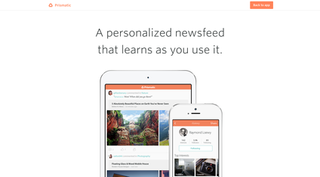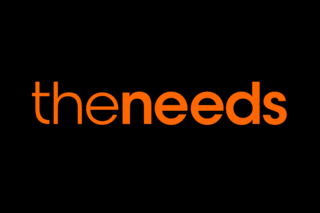
StumbleUpon was a website, browser extension, toolbar, and mobile app with a "Stumble!" button that, when pushed, opened a semi-random website or video that matched the user's interests, similar to a random web search engine. Users were able to filter results by type of content and were able to discuss such webpages via virtual communities and to rate such webpages via like buttons. StumbleUpon was shut down in June 2018.
Personalization consists of tailoring a service or product to accommodate specific individuals. It is sometimes tied to groups or segments of individuals. Personalization involves collecting data on individuals, including web browsing history, web cookies, and location. Various organizations use personalization to improve customer satisfaction, digital sales conversion, marketing results, branding, and improved website metrics as well as for advertising. Personalization acts as a key element in social media and recommender systems. Personalization influences every sector of society — be it work, leisure, or citizenship.
Social search is a behavior of retrieving and searching on a social searching engine that mainly searches user-generated content such as news, videos and images related search queries on social media like Facebook, LinkedIn, Twitter, Instagram and Flickr. It is an enhanced version of web search that combines traditional algorithms. The idea behind social search is that instead of ranking search results purely based on semantic relevance between a query and the results, a social search system also takes into account social relationships between the results and the searcher. The social relationships could be in various forms. For example, in LinkedIn people search engine, the social relationships include social connections between searcher and each result, whether or not they are in the same industries, work for the same companies, belong the same social groups, and go the same schools, etc.

Mobile social networking is social networking where individuals with similar interests converse and connect with one another through their mobile phone and/or tablet. Much like web-based social networking, mobile social networking occurs in virtual communities.
Social network advertising, also known as social media targeting, is a group of terms used to describe forms of online advertising and digital marketing that focus on social networking services. A significant aspect of this type of advertising is that advertisers can take advantage of users' demographic information, psychographics, and other data points to target their ads.

Inq was a social software and app manufacturer who launched two successful software products and a series of award-winning handsets. Material, Inq's personalised magazine, became the top free news app in the UK App Store and achieved a number 4 position in the US, shortly after launch. SO.HO, a social launcher developed by Inq, was also warmly received with press positioning it as an alternative to Facebook Home.

Social media marketing is the use of social media platforms and websites to promote a product or service. Although the terms e-marketing and digital marketing are still dominant in academia, social media marketing is becoming more popular for both practitioners and researchers.

TV Genius was a United Kingdom-based software company that specialize in TV search engines, TV recommendation engines, and EPG development. It was acquired by Red Bee Media in August 2011, and by Ericsson in July 2013. TV Genius became an integral part of the RedDiscovery portfolio with its core work related to TV solutions provided across TV, mobile, web, set top boxes, and devices like PlayStation and Nintendo Wii. The company worked with television operators in pay TV, IPTV, TV listings publishers, and mobile TV providers. It was known for its 3-screen TV search and for developing the Facebook-integrated EPG.
Flipboard is a news aggregator and social network aggregation company based in Palo Alto, California, with offices in New York, Vancouver, and Beijing. Its software, also known as Flipboard, was first released in July 2010. It aggregates content from social media, news feeds, photo sharing sites, and other websites, presents it in magazine format, and allows users to "flip" through the articles, images, and videos being shared. Readers can also save stories into Flipboard magazines. As of March 2016 the company claims there have been 28 million magazines created by users on Flipboard. The service can be accessed via web browser, or by a Flipboard application for Microsoft Windows and macOS, and via mobile apps for iOS and Android. The client software is available at no charge and is localized in 21 languages.
Springpad was a free online application and web service that allowed its registered users to save, organize and share collected ideas and information. As users added content to their Springpad accounts, the application automatically identified and categorized it, then generated additional snippets based on the types of objects added—for example, listing price comparisons for products and showtimes for movies.
Since the arrival of early social networking sites in the early 2000s, online social networking platforms have expanded exponentially, with the biggest names in social media in the mid-2010s being Facebook, Instagram, Twitter and Snapchat. The massive influx of personal information that has become available online and stored in the cloud has put user privacy at the forefront of discussion regarding the database's ability to safely store such personal information. The extent to which users and social media platform administrators can access user profiles has become a new topic of ethical consideration, and the legality, awareness, and boundaries of subsequent privacy violations are critical concerns in advance of the technological age.

A filter bubble or ideological frame is a state of intellectual isolation that can result from personalized searches, recommendation systems, and algorithmic curation. The search results are based on information about the user, such as their location, past click-behavior, and search history. Consequently, users become separated from information that disagrees with their viewpoints, effectively isolating them in their own cultural or ideological bubbles, resulting in a limited and customized view of the world. The choices made by these algorithms are only sometimes transparent. Prime examples include Google Personalized Search results and Facebook's personalized news-stream.

An interest graph is a digital portrayal of an individual's specific interests. Its perceived utility and value stem from the premise that a person's interests form a significant component of their personal identity. They can be used as indicators of various aspects, such as a person's preferences regarding activities, purchases, destinations, as well as who they may choose to meet, follow, or support politically.

Prismatic was a social news curation and discovery application for various Web browsers and mobile devices running iOS. It combined machine learning, user experience design, and interaction design to create a new way to discover, consume, and share media. Prismatic software used social network aggregation and machine learning algorithms to filter the content that aligns with the interests of a specific user. Prismatic integrated with Facebook, Twitter, and Pocket to gather information about user's interests and suggest the most relevant stories to read.
140 Proof, Inc. is an advertising company that uses social data from many sources in targeting relevant ads based on consumers' interests as indicated by their social activity across networks.

News360 was a personalized news aggregation app for smartphones, tablets and the web. It attempted to learn a user's interests by analyzing their interaction with news stories on the app and using semantic analysis and natural language processing to create an Interest Graph and construct a unique feed of relevant content for each user. The app claimed an audience of more than 4 million users.

Trove was a social news aggregation web and mobile application, with apps available on iOS, Android, and Fire Phone. Trove is also the name of the company behind the application, which was owned by Graham Holdings.

Theneeds is a search engine that features content tailored to users' interests, such as articles, news, videos, social posts, and other media.
Automatic content recognition (ACR) is a technology used to identify content played on a media device or presented within a media file. Devices with ACR can allow for the collection of content consumption information automatically at the screen or speaker level itself, without any user-based input or search efforts. This information may be collected for purposes such as personalized advertising, content recommendations, or sale to companies that aggregate customer data.
Taboola, Inc. is a publicly traded advertising and technology company headquartered in New York City. It provides "content recommendation" adverts on its partner websites.










